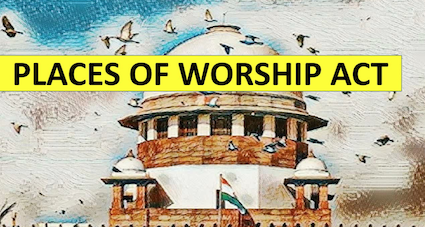The Supreme Court on Friday agreed to hear pleas challenging the Places of Worship Act, 1991.
The apex court said that pleas would be heard by a 3-judge bench on October 11 and asked the concerned parties to complete pleadings.
The Supreme Court allowed applicants to intervene in hearing of pleas on validity of 1991 Act, prohibiting change of character of religious places.
The apex court asked the central government to file response in two weeks on pleas challenging Places of Worship (Special Provisions) Act, 1991.
A representative of the erstwhile royal family of Kashi has approached the Supreme Court challenging the Places of Worship Act, 1992.
The application by Maharaja Kumari Krishna Priya, daughter of the current titular head of the erstwhile royal family, and two others has contended that the 1992 Act is a “textbook instance of a legislation that was passed in the most undemocratic of manners possible, without any regard for fundamental rights of affected parties, in particular the right of formerly colonised indigenous communities to seek reclamation of occupied religious cum civilisational sites”.
The plea filed through advocate J Sai Deepak urged the court to permit them to become parties in writ petitions — already pending and listed for hearing before the SC on Friday — on the issue so that they can present their arguments in law.
On the Places of Worship Act, the application stated, “For a legislation that shuts the doors of justice to affected communities and parties, it was ‘debated’ only on three dates i.e., 23.08.1991, 09.09.1991 and 10.09.1991 and the Bill was passed on the last of the said dates. The debate of 23.08.1991 clearly captures the fact that the period of seven days’ notice was not afforded to members of Lok Sabha before the Places of Worship (Special Provisions) Bill dated 22.08.1991 was introduced”.
That it exempted the Ayodhya dispute from its purview “itself highlights in stark relief the discriminatory, arbitrary and capricious nature of the Act”, the petition said.
It submits that “a study ought to have been undertaken to identify the number of such pending disputes, which too could have been entitled to a similar exemption”. It urged the court to treat claimants of other occupied religious sites at par with owners of Ramjanmabhoomi so that they too have the opportunity to present evidence before a court of law to make good their case for restoration of their sites.
The petition said that “it is indeed shocking that the Government of an ‘independent’, formerly colonised country deemed it fit to enact a legislation which places an embargo on reclamation of occupied religious sites of indigenous/Bharatiya faith systems”. The Act, it added, “is a textbook example of oikophobia/oikomisia and misautogeny i.e., hatred or contempt for one’s own people and culture” and “demonstrates its “colonial consciousness…which perpetuates a state of affairs that existed during the period of colonisation, either Middle Eastern or European”.
The Act “actively stands in the way of the truth being laid bare through constitutional means before a court of law through evidence which is legally admissible”, the application stated.
Stating that it cannot be contended that the Constitution places lesser premium on truth and celebrates all other values, including secularism, at the expense of truth, the plea stated that “every time the truth is brushed under the carpet ostensibly in the name of secularism, it contributes to communal disharmony”. Therefore, it stated, “to contend that the truth must be given a silent burial to preserve secularism and to maintain communal harmony is to commit an error of logic, apart from insensitively taking away the right of the victims of colonisation to present the evidence of the ravages of colonisation and its continuing injustice in “independent” Bharat, namely the continued occupation of their religious and civilisational sites which they continue to hold dear”.
Jamiat Ulema, Muslim Personal Board contend
The Jamiat Ulema-i-Hind and All India Muslim Personal Board had filed petitions opposing the pleas seeking the review of Places of Worship Act, 1991.
The Jamiat had appealed to the apex court to not even issue notice in regards to the challenging pleas and asked for outright dismissal. The Jamiat had said issuing a notice will create fear in the minds of the Muslims.
The Jamiat had contended that if the court agrees to review the Act, it will open floodgates of litigations against countless mosques in the country.
Interestingly, the SC agreeing to hear the pleas challenging the Places of Worship Act, 1991 at a time when the Shri Krishna Janmabhoomi-Shahi Idgah Mosque dispute case and Gyanvapi Mosque case are in the limelight.
Notably, the Allahabad High Court in August directed the lower court to complete the hearing on the petition related to the survey of Krishna Janmabhoomi within four months.


